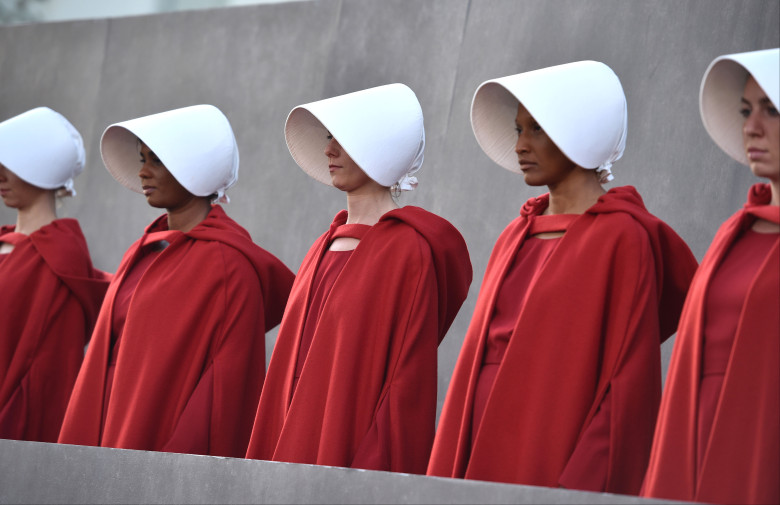The Handmaid’s Tale – Is it time to buy a red cloak?
Mandatory Credit: Photo by Stewart Cook/REX/Shutterstock (9637472bd) Handmaids ‘The Handmaid’s Tale’ TV show premiere, Arrivals, Los Angeles, USA – 19 Apr 2018
Told through the traumatic life of Offred (or June), the new Hulu series The Handmaid’s Tale, originally a novel published by Margaret Atwood, displays a society where the ultimate nightmare of any woman is a new reality. The basic plot of the series is that fertilization and birth rates in the United States of America experienced a terrifying decrease and a “new order of society” was created in order to salvage society. In the nation of Gilead, all the remaining fertile women are assigned a household where they are forced to forget everything about their lives, including their names, families, and occupations. In hopes of balancing the birth rates and starting a new generation, these fertile women become “Handmaids” and are raped every month by the house “commander”. If the Handmaid is impregnated, the Commander’s wife will accompany the pregnancy and, in essence, live it through the Handmaid. As soon as the child is born, the Handmaid is disposed of and the Commander and his family keep the child as if it were naturally theirs. The Handmaids must follow a number of insane rules, such as not being allowed to speak of their previous lives, needing to look down when speaking to any superior, wearing bright red clothing and trenchcoats with a white piece covering their head, participating in stonings to kill “sinners”, and many more.
Although Margaret Atwood’s book and the series as a whole may seem like another dystopian story that calls attention to gender inequality, there is a startling truth behind the fiction of the story. When analyzing the global birth rates for the past 60 years, the total fertility rate has globally decreased by about half than what it was in the 1960’s. Although this number may be attributed to the birth of the baby boomers, the rates have been steadily falling for the past 20 years. In an official report by the National Center for Health Statistics, birth rates for women under the age of 30 reached record lows in 2016. Although the fertility rates in Gilead were reaching around 4 births per year, our current society is on the path of having fewer and fewer children. The lowering of birth rates is attributed to many different reasons, but the population is getting older and we aren’t doing much to replace the old with the new.
Now, infertility in the series is a consequence of years of exposure to inorganic farming and radioactivity that ultimately permanently damaged women’s reproductive systems. To fix this problem, the government sent away groups of women that weren’t fit for the new order of government (this ranges from feminists and lesbians to sinning Handmaids), to the “colonies”, a place where they work all day in the sun, leftover radiation, and pollution until they die out. Although blaming infertility on pollution seems a bit far-fetched, multiple environmental studies have shown that it isn’t as impossible as once thought. A systematic review done by Julie Carré and her colleagues came to the conclusion that “air pollutants cause defects during gametogenesis leading to a drop in reproductive capacities in exposed populations.” Interestingly, different from Gilead, the preliminary research on this topic has shown that infertility problems are actually coming from the sperm of males, and not the women’s reproductive organs. Research done by the Chinese University of Hong Kong demonstrated that out of 6,500 men, there was a “strong association between high levels of fine particulate air pollution and abnormal sperm shape.” Even with this empirical evidence, if one day Earth were to spiral into an overly religious and constraining society like Gilead, women would without a doubt be blamed and punished.
With all of this in mind, I personally won’t be buying red cloaks and white bonnets anytime soon. Yes, fertility rates are dropping, pollution is increasing, and somehow alt-conservatives are making a comeback, but for the time being Gilead is just another dystopian society that doesn’t have the potential to leave the pages or TV screens just yet. Am I completely discarding the idea that one day we might possibly shift into a religiously authoritarian regime? Not quite. But I’m also not adding “blessed be the fruit” to my vocabulary anytime soon.

Sabrina will argue with anyone about anything. Her love for politics and social change will make any conversation become a full-blown discussion in a matter...









